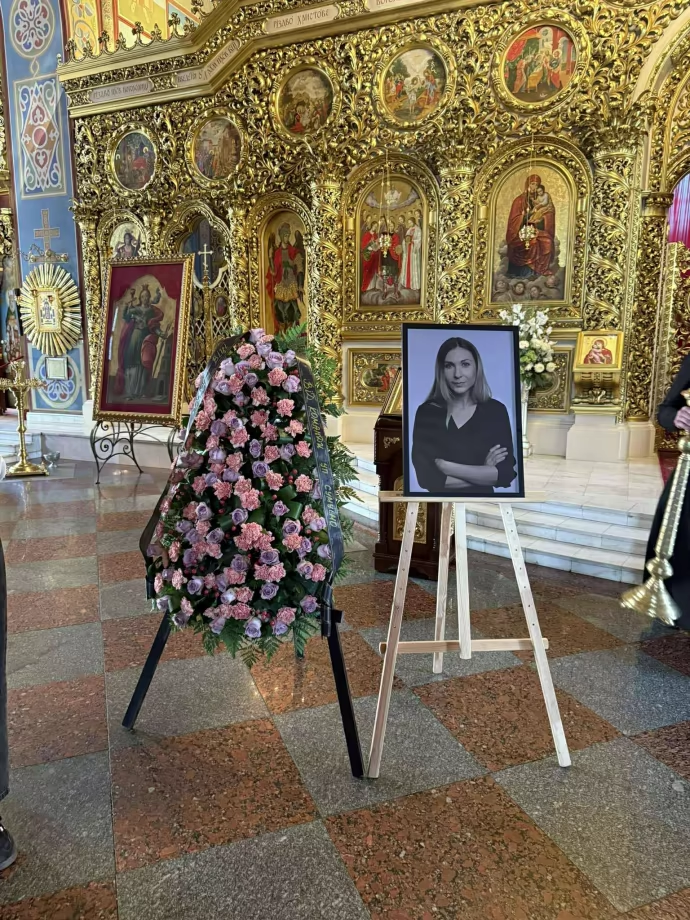A funeral service was held in Kyiv today for Ukrainian journalist Viktoria Roshchyna, who died while in Russian captivity. Friends, colleagues and members of the public gathered to pay tribute to a reporter who dedicated her career to documenting conflict, injustice and human rights abuses in Ukraine’s most dangerous regions.
The ceremony began with a memorial liturgy at St Michael’s Cathedral in the centre of Kyiv. Following the service, a farewell gathering took place on Independence Square (Maidan Nezalezhnosti), before Roshchyna was laid to rest at Baikove Cemetery.
Roshchyna’s funeral was organised by a collective of journalists and editors from several Ukrainian media outlets with which she had worked. Her family, present at the proceedings, requested privacy and asked the press to refrain from seeking comment during the ceremony.
Born in 1995, Viktoria Roshchyna entered journalism at the age of 16. Over the years, she developed a specialisation in criminal justice reporting, human rights issues, and coverage of Ukraine’s judicial system. Following Russia’s full-scale invasion in February 2022, she shifted her focus to frontline reporting, travelling to occupied and conflict-affected areas to document events from the ground. Her work featured in numerous outlets, including Ukrainska Pravda.
In March 2022, Roshchyna was briefly detained by Russian forces in Berdyansk and held for ten days. Despite the risks, she continued her work in occupied territories, publishing first-hand accounts and photo essays from Crimea, Donetsk, and Mariupol. Her reporting included insights into daily life under Russian occupation, the conduct of the 2022 pseudo-referendum in Donetsk region, and the humanitarian crisis in besieged areas.
On 25 July 2023, Roshchyna left Ukraine for Poland, intending to reach occupied eastern Ukraine by way of Russia in order to continue her reporting. She disappeared on 3 August 2023 while working in Russian-occupied territory. For nearly a year, there was no official confirmation of her whereabouts.
In May 2024, the Russian Ministry of Defence formally acknowledged that Roshchyna had been detained. A letter sent to her father, Volodymyr Roshchyn, confirmed that she was in Russian custody, although no details were provided regarding her condition or the charges she may have faced.
On 2 August 2025, President Volodymyr Zelenskyy posthumously awarded Roshchyna the Order of Freedom, one of Ukraine’s highest civilian honours, citing her contribution to independent journalism and her courage in covering the war.
Roshchyna’s death in captivity has prompted renewed scrutiny of Russia’s treatment of detained Ukrainians, particularly journalists and civilians. According to Ukrainian human rights organisations, thousands remain imprisoned or missing in occupied territories or inside Russia. Allegations of torture, enforced disappearances, and incommunicado detention remain widespread.
Ukrainian Journalist Viktoria Roshchyna Dies in Russian Captivity: EU Demands Investigation
Her case is emblematic of the dangers faced by Ukrainian journalists working near the front lines or in occupied areas. Roshchyna had no military background and operated independently, without the protection of an international press organisation. Her reporting relied on local contacts, covert travel, and personal risk.
Following confirmation of her death, Ukrainian civil society groups and media unions have called for an independent international investigation into the circumstances of her detention and treatment in Russian custody. The Ukrainian Ministry of Foreign Affairs has also requested consular access and further clarification from Russian authorities regarding the timeline of her imprisonment and the cause of death.
Tributes from fellow journalists have highlighted Roshchyna’s dedication, perseverance, and commitment to bearing witness. A recent Ukrainska Pravda retrospective described her as “a journalist who lacked everything except indifference,” noting her willingness to go where others could not or would not.
A memorial project launched by her former colleagues aims to preserve her archive and promote press freedom in conflict zones. The project, named simply Viktoria, will include testimony from other former Ukrainian detainees as well as an investigation into systemic human rights violations in Russian detention facilities.
Roshchyna’s legacy now joins that of other Ukrainian journalists killed, imprisoned, or disappeared during the course of the war. Since Russia’s full-scale invasion of Ukraine in February 2022, nearly 150 journalists have been targeted while working, according to Reporters Without Borders. This figure includes those who have been killed, injured, detained, kidnapped, or have gone missing. At least 13 journalists have lost their lives as a result of the conflict, with RSF attributing the vast majority of these deaths to actions by Russian forces. The organisation continues to document cases of abuse against media professionals in both occupied territories and frontline areas.
As mourners gathered on Independence Square, candles were lit and photographs displayed from Roshchyna’s fieldwork in Crimea, Donetsk, and Mariupol. Her final published report, filed in summer 2023, had focused on civilian resistance in occupied towns and the daily pressures faced by residents under Russian administration.
Although the precise date and circumstances of her death remain unclear, colleagues continue to press for answers. Ukrainian human rights advocates argue that her case demonstrates the urgent need for international monitoring mechanisms for detainees held by the Russian Federation, particularly non-combatant civilians.
Viktoria Roshchyna was 30 years old.
Image source: Ukrainska Pravda


